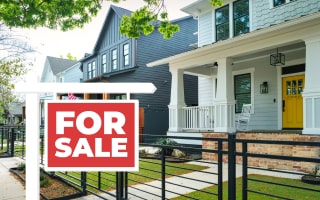Home Buying in Texas

Texas is famous for its vast landscapes, diverse cities, and rich history. With strong economic growth, a booming job market, and an affordable cost of living, there is no shortage of homebuyers looking to settle down in the Lone Star State. Texas has been experiencing tremendous population growth, particularly in urban areas, making it one of the most popular states among homebuyers.
From the vibrancy of its major metro areas to the peaceful countryside, Texas offers various living environments to suit any lifestyle. Texas is also one of the most business-friendly states in the U.S., drawing many new residents from all over the country, especially those seeking career opportunities in technology, energy, healthcare, and education. The Dallas-Fort Worth, Houston, San Antonio, and Austin metro areas are some of the most popular places for those moving into the state, and together, they are home to 70 percent of the state's population.
The median home price in Texas is about $350,000. While this is less than the national median, it is higher than the median home price in the neighboring states of New Mexico, Oklahoma, Arkansas, and Louisiana. Depending on who you ask, the region, and other factors affecting the housing market, Texas is sometimes considered a buyer's market and, at different times, a seller's market. Houses, on average, stay on the market for 50 days before they sell.
Although Texas remains relatively affordable compared to other states, housing prices have risen due to increasing demand. In major cities, home prices are higher than the state's average, driven by limited inventory and fierce competition. Rural areas and smaller towns offer more affordable housing options, but they may lack the proximity to major job centers that many buyers seek.
Those considering buying a home in Texas must first consider their unique housing needs, find a good professional realtor to work with, and get their credit in order. Perhaps the most important step is to research and understand the unique market conditions, not just in the state but also in different regions of the state, and prepare accordingly.
Current Texas Housing Trends
Understanding current housing trends in Texas is critical for prospective buyers looking to enter the market.
Here are some trends to follow:
-
Median Home Price
Although the median home price in Texas is around $350,000, lower than the national average, it can vary significantly depending on location. For example, the median home price in Austin has surpassed $500,000 due to high demand from tech industry professionals. In contrast, smaller cities like Lubbock or El Paso offer median home prices closer to $250,000, making them a more affordable option for homebuyers on a tight budget.
-
Number of Homes Sold
Texas has one of the nation's most active housing markets, with approximately 30,000 homes sold monthly. Large metropolitan areas like Houston, Dallas-Fort Worth, and San Antonio account for a significant portion of these sales. Austin's tech boom has also driven real estate activity in central Texas. Meanwhile, the state's rural and suburban markets continue to grow as remote work becomes more common.
-
Median Days on Market
The median Days on Market (DOM) figure in Texas, which reflects how long a home stays on the market before it is sold, is approximately 50 days, though this varies by region. Homes in fast-paced cities like Austin and Dallas often sell within 20 days, while properties in smaller towns and rural areas may stay on the market for 60 days or more. The state's competitive housing market, especially in urban areas, means buyers must act quickly to secure a home.
-
Supply Statistics
Like much of the country, Texas faces a housing shortage, particularly in its largest cities. For instance, the housing supply in Austin remains below the national average, contributing to higher prices and a seller's market. However, the state has been working to address these issues, encouraging new construction and offering incentives to builders. In more rural regions, supply is less constrained, allowing for more affordable housing options.
How to Find the Right Home to Buy in Texas

You'll need to hire a real estate agent before you can find the right home to buy in Texas. A knowledgeable Texas realtor can help you find a property that meets your unique needs. Look for a real estate agent with strong communication skills, experience working in the state's diverse markets, and strong references. If you have trouble finding the right agent, ask for referrals from family and friends. With your local agent, you'll create a budget and detail your goals and aspirations, examining all the key characteristics of the perfect home for you.
Finding the Right Home
Here are some of the considerations homebuyers must examine when buying a home in Texas:
Location
Texas is the second largest state by land area, spanning 268,596 square miles. Its vast size means that location is crucial in home-buying decisions.
Here are some factors to consider:
-
Urban vs. Suburban vs. Rural: Urban areas like Austin, Dallas, and Houston provide residents access to major job centers and cultural amenities, making them ideal for professionals and families. Suburban areas such as Plano, Frisco, and The Woodlands offer a quieter lifestyle with larger homes and excellent schools. Meanwhile, rural areas like Waco, Tyler, and Fredericksburg provide more space, lower housing costs, and a slower pace.
-
Proximity to Work: Texas is known for its booming job market, particularly in the technology, energy, and healthcare sectors. For those working in these industries, proximity to major employment hubs such as Austin's tech corridor or Houston's energy district can influence home-buying decisions. Many homebuyers are also attracted to suburban communities that offer shorter commutes to the city while providing a more relaxed lifestyle.
-
Public Transportation: Public transportation options are available in major Texas cities, though the state is largely car-dependent. Houston's METRO, Dallas Area Rapid Transit (DART), and Austin's Capital Metro are just a few of the public transit services in Texas's urban areas, but most Texans rely on cars for their daily commutes. When considering where to buy a home, proximity to highways and major roads is important for easy access to work, shopping, and entertainment.
-
Property Taxes in Texas: Texas does not have a state income tax, but its property tax rates are relatively high, averaging around 1.8% of a home's value. However, property taxes vary by county and region, so it's important to factor these costs into your home-buying budget. Property taxes may be lower in more rural areas compared to urban regions like Austin and Houston, where rates tend to be higher.
Types of Homes in Texas
Texas offers various home types to suit different budgets and preferences. Whether you're looking for a traditional single-family home, a condo, or something more unique, the state has it all.
Here are some examples:
-
Single-Family Homes: Single-family homes are Texas's most popular housing option. They offer privacy, yard space, and room for families to grow. However, they also have added responsibilities like maintenance and higher utility costs.
-
Condominiums: Condos are common in urban areas like Austin and Houston. They offer a low-maintenance lifestyle with shared amenities such as fitness centers and pools. While condos often have lower purchase prices, they come with homeowners' association (HOA) fees, which cover maintenance costs and other services.
-
Townhomes: Townhomes provide a middle ground between condos and single-family homes. They offer more space than a condo but require less maintenance than a traditional home. Many townhome communities in Texas feature shared parks and recreational areas, making them popular with families and young professionals.
-
Manufactured and Modular Homes: In rural parts of Texas, manufactured and modular homes are a popular, affordable alternative to traditional housing. These homes are built off-site and assembled on location, providing many of the same benefits as a conventional home at a lower price.
-
Luxury Homes: Texas has no shortage of luxury homes for those seeking high-end living, particularly in areas like Dallas, Austin, and Houston. These homes feature expansive spaces, state-of-the-art amenities, and prime locations in exclusive neighborhoods.
The Typical Home Buying Process in Texas
Buying a home in Texas typically follows these steps:
The home-buying process in Rhode Island includes the following steps:
- Get prequalified for a home loan.
- Work with a local real estate agent.
- Make an offer on your desired property.
- Schedule a home inspection.
- Close on the home and complete the necessary paperwork.
Financing Your Home Purchase in Texas

Texas homebuyers have several financing options, from traditional mortgages to government-backed loans.
![]() Traditional Mortgages
Traditional Mortgages
There are two types of traditional home loans generally available to Texas homebuyers:
- Fixed-Rate Mortgages: Fixed-rate mortgages are a popular option for Texas homebuyers because they offer a consistent interest rate for the life of the loan. This stability allows homeowners to predict and manage their monthly payments, making this loan type ideal for those planning to stay in their home long-term.
- Adjustable-Rate Mortgages (ARMs): ARMs often provide lower initial interest rates than fixed-rate loans. However, the rates can fluctuate based on market conditions, potentially increasing over time. ARMs benefit homebuyers who expect to move or refinance within a few years, taking advantage of the lower starting rates while minimizing risk.
When looking for a traditional mortgage in Texas, homebuyers have a wide variety of state and regional lenders to choose from, including Frost Bank, BBVA Compass, Wells Fargo, and Texas Bank and Trust. These lenders offer competitive rates and a variety of loan products to fit various needs.
![]() Government-Backed Loans
Government-Backed Loans
Government-backed loans are also available to Texas homebuyers who qualify.
These include:
- FHA Loans: FHA loans are ideal for first-time homebuyers and those with lower credit scores. They offer lower down payment requirements and more lenient credit standards.
- VA Loans: Veterans and active-duty military members can take advantage of VA loans, which often come with no down payment and competitive interest rates. The Texas VA Land Board also offers homebuying assistance to vets and military members.
- USDA Loans: USDA loans are available for homebuyers in rural areas. They offer zero-down payment options for eligible properties.
![]() Down Payment Assistance Programs
Down Payment Assistance Programs
Texas offers several down payment assistance programs for first-time buyers or those with limited financial resources. The Texas State Affordable Housing Corporation (TSAHC) provides grants and low-interest loans to help cover down payment and closing costs.
Home Insurance in Texas

While not required by law, most mortgage lenders in Texas require homebuyers to carry homeowners' insurance. The average annual cost of home insurance in Texas is around $4,000, significantly higher than the national average, due to risks associated with hurricanes, floods, and severe storms. Home insurance costs may be even higher in coastal areas or regions prone to natural disasters. For example, many Texas homeowners also need flood insurance, particularly in areas near rivers or the Gulf of Mexico.
Home Buying Challenges in Texas
While Texas offers many benefits to homebuyers, some significant challenges remain, including:
-
Rising Home Prices: In cities like Austin, Dallas, and Houston, home prices have been rising steadily due to increased demand and limited inventory. This makes it more difficult for first-time buyers and those with lower budgets to enter the market, particularly in urban areas with fierce competition.
-
Limited Housing Supply: Like many other states, Texas faces a shortage of available homes, especially in fast-growing metropolitan areas. New construction has not kept up with the demand, leading to bidding wars and higher prices in many cities.
-
Weather-Related Risks: Texas is prone to extreme weather, including hurricanes, floods, and tornadoes. Homebuyers must consider the cost of insuring their homes against these risks, particularly in coastal regions and flood-prone areas. The cost of home and flood insurance can add a significant expense to home ownership in the state.
-
Competitive Markets: In the state's biggest cities, the housing market is highly competitive, with many homes receiving multiple offers within days of being listed. Buyers in these areas need to be prepared to act quickly and may face bidding wars, especially for desirable properties in popular neighborhoods.
Home Inspections in Texas
Home inspections are another crucial piece of the home-buying puzzle. They protect buyers from costly repairs by uncovering problems like foundation issues, leaky roofs, or other disastrous conditions. They can also help home buyers negotiate a better price if the inspector finds anything that needs fixing.
A home inspection covers various items and includes a physical inspection of the entire home, photographs, and a written report. Some of the items that an inspector will focus on include:
-
Structural Elements: The inspector will review the foundation, walls, floors, ceiling, and stairs for signs of decay or damage.
-
Roof: Inspectors check the condition of the shingles, flashing, gutters, and chimney, examining them for leaks or other signs of wear and tear.
-
Home Exterior: They will also check the home's exterior (siding, windows, doors, etc.), looking for leaks or signs of damage.
-
Heating, Ventilation, and Air Conditioning (HVAC): Inspectors will test the heat, air conditioning, and ventilation systems to ensure they operate correctly and comply with safety codes.
-
Plumbing: The inspection also includes checking pipes, fixtures (tubs, sinks, toilets), and the water heater, as well as looking for any leaks, damage, or other issues.
-
Electrical: Inspectors will also examine wires, outlets, electrical panels, circuit breakers, and light fixtures for safety and compliance.
-
Attic: Attics, too, can have issues that could be costly to fix, like insulation, ventilation, water damage, and rodents.
-
Foundation: An inspector will search the foundation for water damage, leaks, and cracks, indicating more significant problems.
-
Interior: They will also examine the house's interior (walls, ceilings, floors, windows, etc.), looking for signs of damage or structural issues.
-
Tests: Some include tests for mold, radon, termites, asbestos, lead paint, and other contaminants.
A home inspection in Texas costs between $300 and $600, depending on the size, square footage, and other factors. A good-sized home may cost closer to $600 in Fort Worth, TX.
The Process
If the buyer applies for a mortgage, the lender will require an inspection; otherwise, the buyer can choose to have one done. However, either way, the buyer must pay for it. The buyer may shop around for a reputable inspection company and schedule the inspection with their favorite.
Some of the top home inspection companies in Texas are:
- Texas Pro Home Inspection, Fort Worth, Texas
- Texas Edge Home Inspections, PLLC, Spring, Texas
- A Plus Inspections of Texas, The Woodlands, Texas
- Texan Inspection Service, Richmond, Texas
- Stonebriar Property Inspections, Dallas, Texas
The inspection takes between 2 and 4 hours. The inspector needs to evaluate every inch of the home. Times vary based on the size and age of the house, as well as the types of systems and weather conditions. Once completed, the inspector will provide a comprehensive report detailing their findings.
The final step is to review the report and decide whether the buyer must take up any issues with the seller.
After the Inspection
After the inspection, the buyer has some options. If there are significant issues, they can negotiate a lower price or ask the seller to repair before closing. They can also completely back out of the deal, ask for a home warranty, or reduce the down payment.
Inspections in Top Cities
| City | Inspection Cost | Local Issues | Specific Rules | Local Home Types |
| Home Inspection in Houston | $300-$500 up to $800 | Flooding, tornadoes = water damage. | Inspectors must adhere to the TREC's Real Estate Inspector Standards of Practice (SOPs) and provide a completed TREC Property Inspection Report Form (REI 7-6). | Home types include ranch, hill country, modern farmhouse, contemporary, craftsman, and traditional. |
| Home Inspection in San Antonio | $300-$600 | Extreme heat, thunderstorms, and tornadoes. | Lenders require an inspection for FHA loans. | Texas ranch style, Texas hill country, Spanish revival, and vernacular homes. |
| Home Inspection in Dallas | $300-$500 | Severe thunderstorms can cause roof and window damage. | Home inspections are regulated by the Texas Real Estate Commission (TREC). Licensed home inspectors must follow the TREC's Real Estate Inspector Standards of Practice (SOPs). | Colonial, craftsman, and Mediterranean. |
| Home Inspection in Forth Worth | $400-$600 | Severe thunderstorms, and hail causing roof and exterior damage. | Building permits require a certified home inspection. | Colonial craftsman, Victorian, contemporary, ranch, modern, and mid-century homes. |
| Home Inspection in Austin | $300-$600 | Severe storms, hail, flooding. | Inspections are not mandated. | Ranch, hill country, Spanish colonial, craftsman, and Victorian. |
Navigating the Diverse Texas Housing Market
Buying a home in Texas offers many opportunities, from the bustling urban life in cities like Austin and Houston to the peaceful charm of rural towns like Fredericksburg and Tyler. The state's strong job market, affordable cost of living (compared to other coastal states), and diverse housing options make it an attractive destination for many homebuyers.
However, navigating the diverse Texas housing market, especially in high-demand areas, can be challenging. Rising home prices, limited inventory, and weather-related risks can create obstacles for buyers, particularly first-time homebuyers. To successfully navigate these challenges, it's essential to be well-informed and well-prepared. This includes securing pre-approval for a mortgage, working closely with a knowledgeable real estate agent, and understanding the specific market trends in your desired location.
You can find your dream home in Texas with careful planning, research, and the right support. Whether you're drawn to the vibrant cities, sprawling suburbs, or quiet rural landscapes. Texas continues to offer great potential for homeownership, and with the right approach, homebuyers can enjoy everything the Lone Star State offers.
Instant Access to Texas Property Records
- Owner(s)
- Deed Records
- Loans & Liens
- Values
- Taxes
- Building Permits
- Purchase History
- Property Details
- And More!